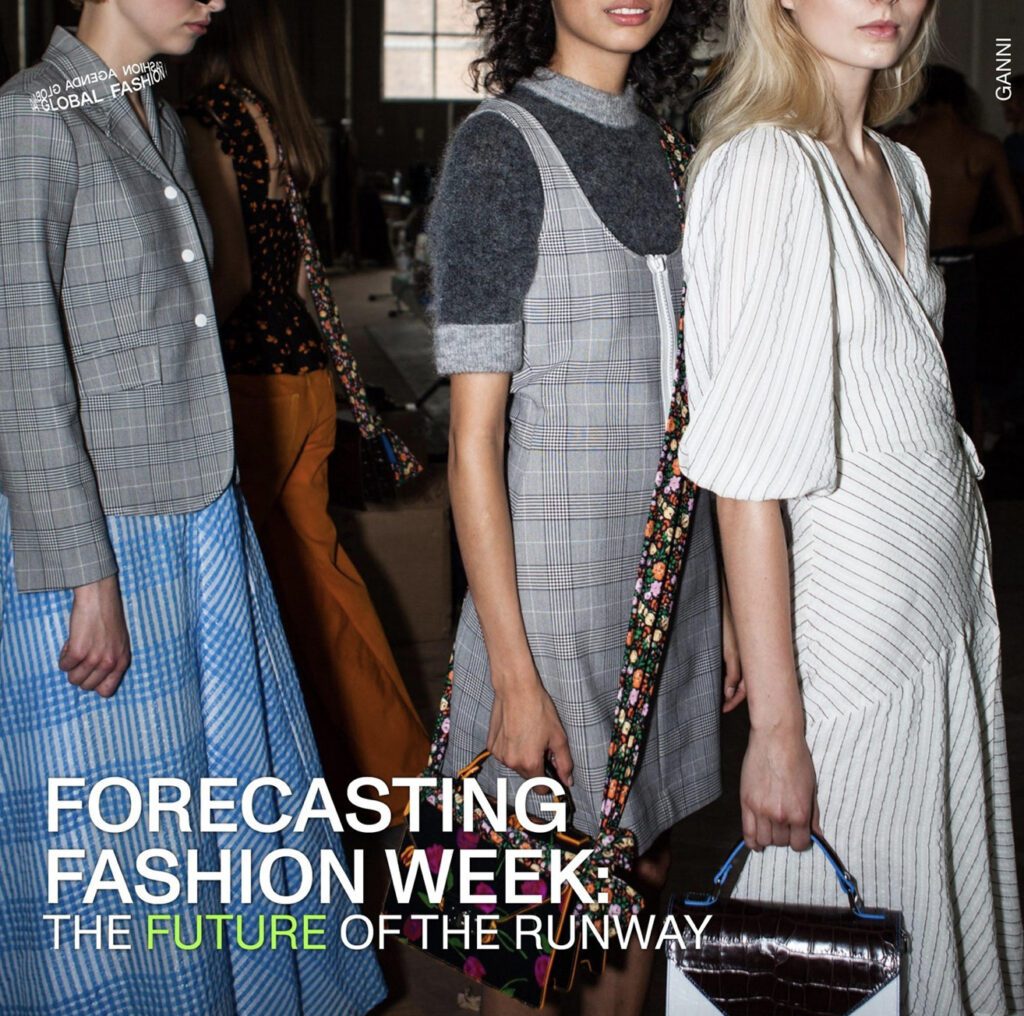Forecasting Fashion Week: The Future of the Runway


Today ‘sustainable’ practices are being adopted at every level of the fashion industry’s value chain, but what actions are being taken to improve practices related to fashion shows?
What was once a spectacle defined by countless international flights, a myriad of different fashions for street style snaps, extravagant single-use runway sets, and events which at the core centred around commerce and consumerism, all came to a grounding halt last year in the wake of the coronavirus pandemic.
Now, with fresh perspectives and innovations, we shine a spotlight on the opportunities and measures being taken to prioritise sustainability and consider the digital legacy that may be left behind when we emerge from the COVID-19 pandemic.
Over the last few years Copenhagen Fashion Week (CPHFW) has firmly cemented itself as a frontrunner for sustainability standards in fashion weeks, launching a SUSTAINABILITY ACTION PLAN in 2020 and a follow-up ANNUAL SUSTAINABILITY REPORT status update for 2020. With these come all-encompassing goals such as a zero waste by 2022 plan, demands for social justice, as well the ambitious SETTING OF EIGHTEEN STANDARDS that those showcasing at CPHFW must comply with from 2023. Moreover, in partnership with Zalando, CPHFW present the ‘ZALANDO SUSTAINABILITY AWARD’. Measures such as this champion authentic claims from brands surrounding transparency and environmental impacts.
Elsewhere in Europe, some of the notorious “Big Four” fashion weeks have been pushing sustainability to the forefront. With all fashion weeks spotlighting a variety of up-and-coming sustainability focused designers, we are also seeing many classic brands shaking things up – take for example Coach combining pieces from its archives with a new collection and Gucci opting for two seasonless shows a year.
Paving the way for credible information regarding the true impact of these events, Paris Fashion Week recently announced plans to develop tools to measure the environmental, social and economic impacts of fashion shows, set to launch for the SS22 season this September.1
At Milan AW21 the project ‘DESIGNER FOR THE PLANET’ was developed to showcase independent designers with commitments towards the future of the industry.
Amidst London Fashion Week AW21 The Centre for Sustainable Fashion at London College of Fashion, UAL launched FASHION VALUES, a free educational platform promoting sustainability within the fashion industry in partnership with Kering, Vogue Business and IBM.
Priya Ahluwalia of eponymous brand ‘Ahluwalia’ received the prestigious Queen Elizabeth II Award for British Design in recognition of Ahluwalia’s work in “pioneering responsible sourcing and manufacturing techniques, while telling the stories of those who make her clothes and the communities she works with”.2 Learn more about Ahluwalia and her work in our CFS+ 2020 Designer Challenge HERE.
During LFW AW21 we also saw the launch of the first higher education DEGREE IN DIGITAL FASHION, indicative of the continuity of the digital elements many were forced to embrace in the past year at fashion weeks.
Steff Yotka for Vogue described ‘phytigal’ as that which is part IRL, part URL,3 and given the reach of online and social media, it makes logical sense that going forward shows are hybrid in nature – digital shows can be accessed millions.
Whilst many acknowledge that traditional physical fashion weeks are not only exclusive, but also, according to one report, contribute 241,000 tonnes of CO2 emissions annually,4 there is also the inescapable fact that the physicality of these creative crescendos holds a certain unique magic that goes amiss via the blue light of a screen. How then can we adapt and balance this conundrum?
Following COVID-19 it has been speculated that fashion weeks will never amass the same such crowds as they did pre-pandemic, and could this return to intimacy be part of the equation for sustainable fashion weeks? The solution seems to lie in meaningful and intimate shows that expertly execute the delicate balance between digital and physical. Not only might this be better for the planet but also, according to the BFC and CFDA, better for the wellbeing of those regularly flying to attend these physical events in often far-flung locations.5
Designers are already conjuring up unique and exciting ways to present digitally with everything from Balenciaga’s video game to Loewe’s show in a box, the opportunities are endless.
However, digitalisation isn’t a fail-safe answer. The often-invisible infrastructure of the communications and technology sector is responsible for two percent of global GHG emissions.6 So, going forward places must seek to balance the carbon footprint of both physical and digital events and preserve these powerful mediums to communicate about sustainability.
Fashion shows historically have immense cultural significance, transmitting new ideas in unique ways. As these events are beginning to reflect the important shift towards sustainable fashion, it is critical to recognise that we can’t simply dismiss Fashion Week, but rather we must reinvent it and harness its influence for good. There is no better platform for an open dialogue about the trajectory the industry must be on as these spectacles attract masses of people globally. Fashion Week is a creative outlet in which we can shape the future of fashion. Raising awareness and presenting highly creative people with the task at hand will prompt and galvanize people to come up with cutting-edge solutions.
1. Guilbault L. Paris Fashion Week’s new plan to measure environmental impact. Vogue Business. 2021.
2. British Fashion Council. Priya Ahluwalia Receives the Queen Elizabeth II Award for British Design. British Fashion Council. 2021.
3. Yotka S. Fashion Shows Are Dead, Long Live Fashion Shows! Vogue. 2021.
4. Odre. Zero to Market. 2021.
5. Dirvanauskas G. What is the future for fashion weeks? Drapers. 2021.
6. Chan E. Are Digital Fashion Weeks Really More Sustainable? British Vogue. 2021.